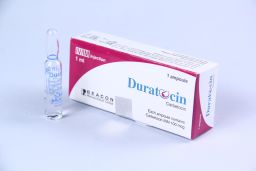A new formulation of a drug that prevents excessive bleeding after childbirth could save thousands of women’s lives around the world, according to a new study.
Postpartum hemorrhaging (PPH) – or excessive bleeding after childbirth – claims the lives of tens of thousands of women a year and is generally treated with a drug called oxytocin.

But the new research found a new version of the drug carbetocin, that does not require refrigeration, is as effective as oxytocin in preventing this form of hemorrhage. Oxytocin, must be stored at cool temperatures – between 2 and 8 degrees Celsius (35.6-46.4 degrees Fahrenheit). Carbetocin is already known to be safe and effective at preventing hemorrhage but this reformulation used in the study offers an alternative without the challenge of cold transport and storage.
In countries that do not have the storage capacity to hold oxytocin, many women are denied this life saving treatment, according to the WHO study published on Wednesday.
“For many years we have been looking for a heat stable product that could be as effective as the oxytocin, and today we can say that we have it,” said Ms Mariana Widmer, Technical Officer at WHO Department of Reproductive Health and Research, lead author of the study.

Carbetocin is very similar to oxytocin. But instead of breaking down at low temperatures, carbetocin has been shown to remain stable at 30 degrees Celsius (86 degrees Fahrenheit) and at 75% relative humidity for up to 36 months. (Oxytocin is more sensitive to humidity than heat.)
“Giving drugs to contract the uterus after childbirth is considered the cornerstone of efforts to prevent post- partum haemorrhage,” said Ian Roberts, Professor of Epidemiology & Public Heath at London School of Hygiene & Tropical Medicine, who was not involved in the study. “Oxytocin is the drug currently recommended but it is heat sensitive and loses potency in hot climates – the sorts of places where many mothers die.”
Which is why researchers compared the effectiveness of carbetocin and oxytocin and demonstrated that carbetocin can withstand high temperatures and is both as safe and as effective as oxytocin in preventing PPH, defined as blood loss of at least 500ml after vaginal birth.
To do this they followed 29,645 women from 23 different sites in 10 different countries, including Argentina, Egypt, India, Kenya, Nigeria, Singapore, South Africa, Thailand, Uganda, and the United Kingdom, between 2015 and 2018.
“The development of a drug to prevent postpartum haemorrhage that continues to remain effective in hot and humid conditions is very good news for the millions of women who give birth in parts of the world without access to reliable refrigeration,” said Dr. Metin Gülmezoglu, the coordinator of maternal and perinatal health and preventing unsafe abortion team at WHO, who also worked on the study.
Around 14 million women globally suffer from PPH each year, and 70,000 women die as a result, according to the study published Wednesday in the New England Journal of Medicine. It is the most common cause of death among women giving birth. The researchers noted that between 2003 and 2009, PPH resulted in 661,000 deaths worldwide. Most of these deaths occurred within the first 24 hours after birth.
PPH is largely preventable in the developed world, however in developing countries, where maternal health services are less prevalent, the condition causes up to 60% of maternal deaths.
“This is a truly encouraging new development that can revolutionize our ability to keep mothers and babies alive,” said Dr. Tedros Adhanom Ghebreyesus, Director-General of WHO in a statement.
Join the conversation
But there are some caveats, most prominently, the feasibility of rolling out carbetocin.
“Heat stable carbetocin is much more expensive than oxytocin. The drug company that makes it has an agreement with WHO to make it available at a reasonable price in poor countries but the devil is in the detail,” said Roberts.
“What will it actually cost? Which countries will receive it? For how long? Will it reduce availability of the cheaper oxytocin? And what about poor mothers in rich countries? These are all factors that need to be considered.”






